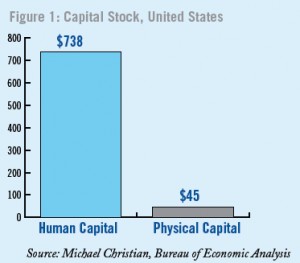In the Fourth Revolution book we argue that traditional accounting is obsolete. On of the arguments is: it does not measure human capital.

Some economists have tried it though at the national level and here is the result, in this figure. Amazing, isn’t it?
There is some debate among economists on the derivation of the human capital value. This one was derived in this article, Human Capital Accounting in the United States 1994-2006. The article is a bit dry, so let’s summarize the basis for the calculation. The Human Capital is measured as the present discounted value of lifetime incomes (market and non-market) of the entire population. Interesting is that in the US, human capital does not increase as a result of higher education, but only as a result of population growth, which is mainly driven by immigration. Education levels remain relatively constant at the moment.
The issue of human capital is thus related to the issue of immigration, as discussed for example in this article, “The human capital imperative, bringing more minds to America“.
In this area, Singapore has gone one step further: faced with a declining local population due to low birth rates, the Singapore government actively scours the schools of South East Asia for clever kids and offers them a fully-paid scholarship, up to their university studies included, under the condition that they stay and work for the first few years of their career. They even enroll a large contingent of Continental Chinese students that way. They certainly hope that these young people will stay and found a family in Singapore. Note that as a country, they actively go and seek gifted kids in remote schools of China! It is thanks to this proactive human resource policy that Singapore constantly increases its Human Capital, the key to the Collaborative Age.
In some other countries, the debate about immigration seems to be from another age. Japan declines because it does not culturally accept immigration.
In the Collaborative Age more than ever, Human Capital is key to economic development. It needs to be increased, both through education and number. It’s the key to prosperity.
Note – this article was initially inspired by Alex Tabarrok’s blog post Human Capital.
